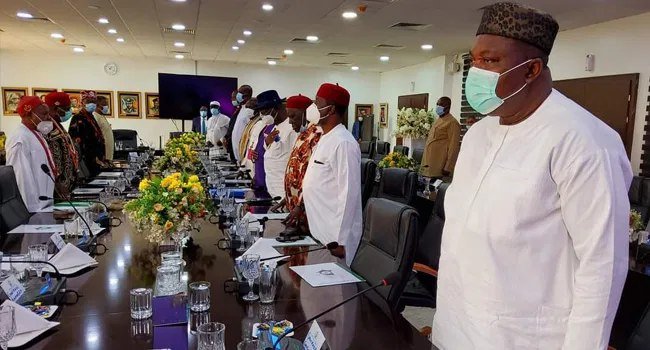The news came so subtly and quite unusual with stories associated with such giant newsmakers: that Governors of Southern Nigeria met on May 4 on the State of the Nation. Fifteen of the 17 Governors were said to have attended, while two were represented by their deputies, with the promise of a follow-up meeting this week. Notwithstanding that it was a virtual meeting, which starved it of the usual fanfare, its proponents deserve commendation by all lovers of peace in the continued threatened corporate existence of this nebulous federation.

Following the Resolution at the Berlin Conference, on February 26, 1884, partitioning Africa on the Principle of Effective Occupation by European powers, a British Protectorate Administration was, on June 5, 1885, proclaimed on the territory from the Lagos boundary in the West to the right bank of the Rio del Rey now in Cameroon. The British Crown resorted to signing new treaties or validating existing Trade Agreements with recognised traditional institutions in the name of the Treaty of Friendship and Protection. By 1861, Lagos was annexed by Britain which declared colonial administration thereat in 1862, and by November 29, 1895, the colonial Legislative Council extended its authority eastwards through the coastal territory of the present Ondo State to the junction of Okutimakoro and Adabrassa creeks and the Benin River in the present Edo and Delta states.
By 1900, British colonial administration was proclaimed on the whole of Nigeria, with the territory divided into the Colony of Lagos, Southern and Northern Protectorates. According to Chief Obafemi Awolowo, in his book, The People’s Republic, on January 1, 1900, when the Protectorate of Northern Nigeria was inaugurated, slave raids, the slave trade, and slavery was prevalent in most parts and internecine wars continued to be waged. The territory is large and posed great difficulty in finance and personnel in administration. The British also had local Fulani imperialism, which had been in control of the larger part of the territory for about a century to contend with. Lord Frederick Lugard, an Army Captain and appointed British High Commissioner, was able to bring the situation under control within six years with a combination of military force, diplomacy, and pacifist administrative strategy of the Indirect Rule system.
The Southern part of Nigeria was made more easily accessible through the Bights
of Benin and Biafra, and great lagoons and rivers that criss-cross the territories. By 1900, Christian missionaries, which started operations in many parts of the South since the 1840s, have entrenched themselves, opened schools, hospitals, dispensaries, and produced elites among whom were adherents of both Christianity and Islam. Relative infrastructural development had taken place such that by 1898, the streets of Lagos had been electrically lit and by 1900, a number of roads have been constructed: Ebute Metta to Ibadan railway completed, Carter and Denton bridges across Lagos lagoon to the Mainland at Iddo also delivered. The two administrative structures of Lagos Colony and the Protectorate of Southern Nigeria were merged in 1906.
Captain Lugard who had resigned as High Commissioner of Northern Nigeria in 1906 to take up an appointment as Governor of Hong Kong in 1907, was drafted back to Nigeria in 1912, now a Brigadier General and appointed Governor of Northern and Southern Nigeria. For economic reasons of subsidising the deficit budget of Northern Nigeria with the surplus of the South, Lugard was said to have decided to conduct the involuntary marriage between the “rich wife of substance and means” and the “poor husband” resulting in the amalgamation of Southern and Northern Protectorates in 1914.
In spite of its relatively greater diversity in terms of ethnic composition and religion, the far bigger North was kept as one but the union of the smaller South was soon broken by the British into Eastern and Western regions and kept perpetually apart for Northern domination into Independence in 1960 and ever since. In other words, the monogamous North/ South marriage of 1914 became polygamous of North/ East-West, with the two new wives in such internecine rivalry for easier domination of their oppressive husband they both struggle to impress or eke a token from.
The political leaders of the Fulani to whom the British shrewdly handed over Nigeria at Independence were also skilled political craftsmen, scheming to weave together the more ethnically diverse Northern region. A non-existent Hausa/Fulani tribe was coined to give the conquered Hausa majority a false sense of power and influence. The ruling tribe craftily held on to real power while conceding attractive but bogus positions to other groups, also controlled invariably by the oligarchy, thereby sitting on the North while making the South the footstool. Thus, Sir Ahmadu Bello was content with the Premiership of the North in furtherance of the vision and mission of Uthman Dan Fodio, donating Prime Minister of the uncertain contraption of the Nigerian federation to Tafawa Balewa of the minority. From Borno to Borgu, Katsina to Igala, including the Yoruba enclaves of Ilorin and Kabba Provinces, Sardauna held sway.
The hegemony was so effective that the likes of Joseph Tarka of the Middle Belt, Josiah Olawoyin of the Kwara/Kogi region who were allies of Awolowo were seen only as rebels. By 1953, when Enahoro moved the motion for Nigeria’s Independence in 1956, the North, in one accord, said it was not prepared and that the British should only lower its Union Jack flag as soon as practicable. In reaction to the molestation of their members in the House of Representatives, on that score, by people on the streets of Lagos, the North declared Araba, to secede from Nigeria, even if that meant suicide for the landlocked region provided it was secured for the caliphate. Only the counsel of Britain to the contrary pulled back the North.
The coup of July 1966 was in reaction to that led by Chukwuma Nzeogwu of January in which the enigmatic Northern Premier was assassinated. The masterminds and executors of the vengeful Northern coup were mainly of minority groups that dominated the military. Even subsequently as military Governors and Heads of State, these minority elements joyfully served the interests of one North and invariably the Caliphate.
Evidently incompetent and lacking the political dexterity of his ancestors, President Buhari has not only exposed the diversity of the north, putting a spanner to the carefully knitted northern architectural design, in his lackluster handling of kidnapping, rape, mass killings, and untold criminality against all which are unabashedly traceable to men of his Fulani tribe. From Zamfara, Kebbi, Katsina, Kaduna, Taraba, Plateau, Nasarawa, Benue, Kogi, etc, it is your land for the Fulani herdsmen or your life with the active acquiescence of the Presidency and unbridled celebration by the President’s spokespersons.
Read Also: See What Femi Fani-Kayode Told Southern Leaders As North Backs Social Media Bill
In spite of all of these, the Governors of the 19 Northern States still meet in a Northern Governors Forum, while their Southern counterparts still fragment themselves in geopolitical arrangements of South West, South East, and South-South. It is often very convenient for the President to meet with Governors of the North while only sparingly and reluctantly meeting Southern Governors on a geopolitical basis.
The salvation and unity of Nigeria lie in the unity of the South which tribes are, by far, more at peace with one another. The oppressed minority of the North which, pulled together, are in a clear majority, look up to the unity of the South for their own salvation. No tribe in the South has a territorial contest with the Middle Belt, or desirous of their conquest for traditional hegemony. At the 2014 National Conference where I was a Delegate, the resolutions reached on major issues were predicated on the unity of the South which gave the Middle Belt delegates the confidence to team up for national consensus.
Read Also: Southern Leaders, Middle Belt give FG 90 Days To Repeal 1999 Constitution
The now effective Southern Leaders/ Middle Belt Forum was borne out of the necessity for national consensus for the inevitable restructuring and re-negotiation of the Nigerian federation and its corporate existence. The emergence of the Southern Governors Forum and of its legislators at the national and states levels is the reinvention of the reality of the entities that birthed the Nigerian union in 1914. Incidentally, the entire South and the Middle Belt, which constitutes over 70 percent of the federation, agree on the inevitability and imperative of the restructuring and renegotiation of the terms of the Nigerian federation.
Source: Vanguard
Follow us on Twitter
Post Disclaimer
The opinions, beliefs and viewpoints expressed by the author and forum participants on this website do not necessarily reflect the opinions, beliefs and viewpoints of Anaedo Online or official policies of the Anaedo Online.

